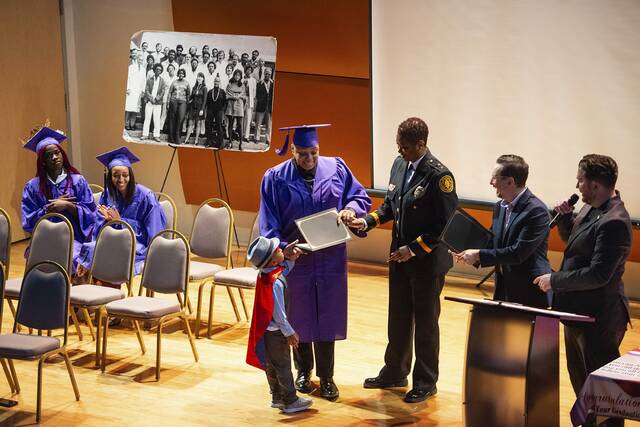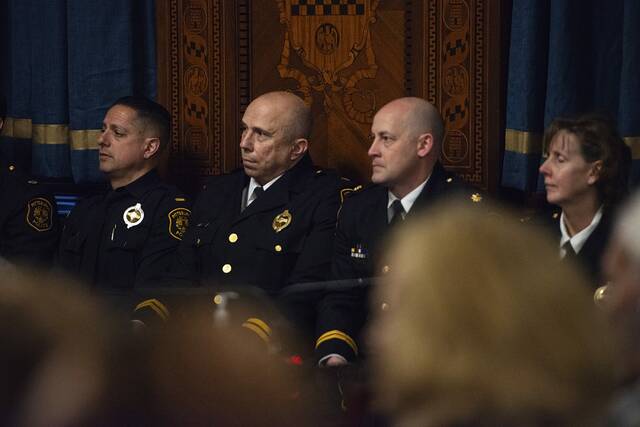The portraits of the two young men presented to the judge were so very different.
Alexander Yerkey graduated from the University of Pittsburgh in 2020 and was working in transportation planning. He had a longtime girlfriend and a rescue cat — despite being allergic. He loved his mom so much he sent her flowers on Valentine’s Day and was so close to his twin sister that he’d drop everything at 3 a.m. on a weeknight to help her with a migraine.
Lukas Kislak, who was working in the stagehands union in Pittsburgh, was showing symptoms of mental illness. His grandfather had killed himself, as did his girlfriend. His mother was schizophrenic. He struggled with addiction as a way to self-medicate. He’d overdosed 17 times.
On March 26, 2023, their worlds collided as Yerkey rode his bike to a pickup baseball game with his buddies under the Bloomfield Bridge.
Kislak, in the throes of paranoid delusions, without provocation shot Yerkey in the head at close range.
Yerkey died a short time later. He was 26. Kislak was arrested and charged with criminal homicide.
On Thursday, Kislak, 36, of Braddock pleaded guilty but mentally ill to third-degree murder and was ordered to serve 15 to 40 years in state prison.
During his hearing, defense attorney Heath Leff described his client’s struggles — not as an excuse, he said, but as an explanation.
“You can do a monstrous thing and not be a monster,” Leff said. “We are all more than the worst things we’ve done.”
‘Mental break’
Pittsburgh police were called to Corday Way and Pearl Street in Bloomfield after a ShotSpotter alert at 2:35 p.m. that sunny Sunday afternoon.
There, they found Yerkey in critical condition.
A witness told police that shortly after Yerkey rode his bike past, there was screaming and a gunshot. The witness went around the corner and saw Kislak standing over Yerkey with a gun in his hand.
Officers found Kislak a short time later in the 5000 block of Penn Avenue. He still had the gun in his waistband, said Allegheny County Assistant District Attorney Lauren Sowko.
He cooperated with investigators and said he thought he was having a “mental break.”
Video surveillance cameras captured the killing.
That morning, Kislak, who was paranoid, went to Pittsburgh’s Zone 5 headquarters in Highland Park claiming his phone and computer had been hacked. An officer told him he needed to talk to the FBI, Sowko said.
Later that day, Kislak went to UPMC Children’s Hospital of Pittsburgh for help, Leff said, but they turned him away.
The shooting happened that afternoon.
After Kislak’s arrest, he was taken to Torrance State Hospital where he was diagnosed with schizoaffective disorder and severe opiate use disorder.
Experts retained by both the prosecution and defense agreed that, at the time of the shooting, Kislak “lacked the substantial capacity to conform his behavior to the law,” Sowko said.
The prosecution agreed to let him plead guilty but mentally ill — which will allow him to continue to receive psychiatric treatment as he serves his state prison sentence.
Stolen future
On Thursday, witness after witness described Yerkey as kind, compassionate, witty, hardworking and generous.
He was enrolled in work study at Pitt and had jobs at Goodwill and Home Depot to support himself.
Yerkey was passionate about city planning and loved the City of Pittsburgh.
He’d played baseball since he was 4 years old, and continued as an adult. He enjoyed hockey, and was playing for a city team.
He played bass guitar and liked The Beatles.
“We’re all mourning a future that was stolen from him,” said his uncle, Daniel Lynch, in a statement to the judge. “The joy has been drained from our lives.”
His aunt, Patricia Lynch, said her heart breaks for Yerkey’s twin, Lindsay.
“I imagine it must be like losing a part of yourself.”
Lindsay Yerkey told the court that her brother could make friends anywhere.
His murder, she said, has left her unsettled and afraid.
“I don’t even remember the old me,” she continued. “When he died, half of my soul went with him.”
Ellen Yerkey told the court that her husband died when Alex and his twin were just 3 years old, leaving her to raise them and their older brother alone in Bethel Park.
“I miss Alex 24 hours a day. There’s no time I don’t think about my precious son,” she said. “I always protected my kids from evil, but I could not do it on that day.”
Schizophrenic mother, alcoholic father
Kislak’s uncle told the court his nephew was a fun-loving child, known as a prankster with an infectious smile.
“He was a beautiful boy,” said Donald Rager. “He still is.”
But Kislak’s mother had schizophrenia, Rager said, and his father was an alcoholic.
After Kislak graduated from high school, Rager and his husband helped him get into the international stagehands union, working in Pittsburgh on commercials and other projects.
Kislak, a talented pen and ink artist, also played bass and was part of Pittsburgh’s punk rock community, playing in a number of bands.
Eventually, Rager said, Kislak began using opioids, though he and his husband did not know.
His nephew was self-medicating, Rager said, and overdosed 17 times.
Kislak’s friends in the punk community did not tell his uncles, believing they would overreact.
Although Kislak’s girlfriend attempted to get him clean, Rager told the court, there were two failed stints at rehab.
Brad Fombelle, who worked with Kislak, said he sent him home from work twice — including the day before the shooting.
“There were times you could tell he wasn’t well,” he said.
But since Kislak has been incarcerated — and in mental health treatment — Fombelle told the court “I’ve never heard him more clear and concise and sounding well.”
Absence of malice
Kislak, his hands cuffed in front of him, spoke briefly to the court, apologizing to Yerkey’s family.
“I should have (sought) help earlier,” he said. “I didn’t, and this thing occurred. All I can say is that I’m sorry.”
Leff, the defense attorney, told the court that the onset of symptoms of his client’s mental illness began in his 20s, but that his hand had been dealt since birth.
“We’re all products of our genetic code,” Leff said.
At the time of the shooting, Kislak had been awake for several days and was having paranoid delusions, he said.
Still, he tried to get help — going to his uncles, the police and the hospital.
“He sensed he needed help, but he was too psychotic to get it the right way,” Leff said. “Mr. Kislak is not irreparably broken.”
He told the court his client had no malice in committing the shooting.
“He is guilty, but it was due to mental illness,” Leff said. “Please fashion a sentence that is merciful for Mr. Kislak, that is lenient for Mr. Kislak.
“He was sick, and he was ill that day, and this tragedy happened.”
’Senseless act’
The prosecutor acknowledged Kislak’s mental illness, and that there was no intent.
That’s why, Sowko said, the district attorney’s office reduced the charge from first-degree to third-degree murder.
Yerkey, she continued, was a truly innocent victim, and Kislak had a responsibility to get treatment for his mental illness.
“Guilty but mentally ill doesn’t excuse all responsibility,” Sowko said.
Common Pleas Judge Katherine Emery agreed, finding that anything less than a standard-range sentence would depreciate the seriousness of the crime.
“You can’t just blame mental illness,” Emery said. “It was a burden placed upon you.”
But she continued, how Kislak reacted to that burden was wrong.
“I’m deeply moved by how [Yerkey’s] death has affected the whole community,” she said. “It was such a truly senseless act.”















